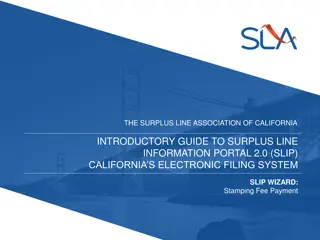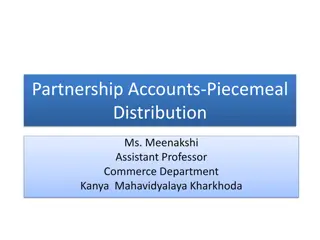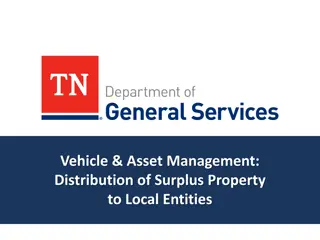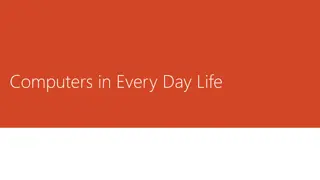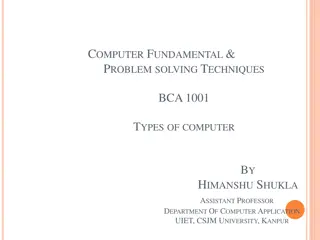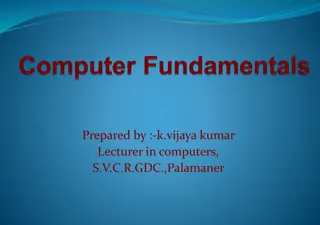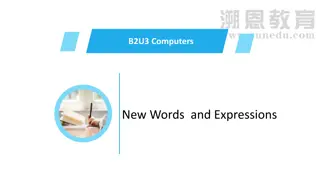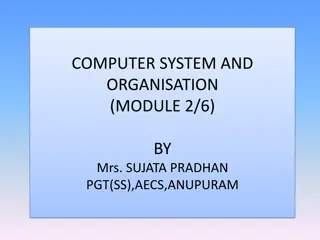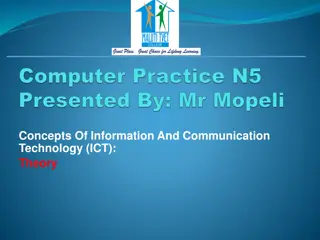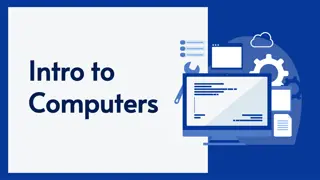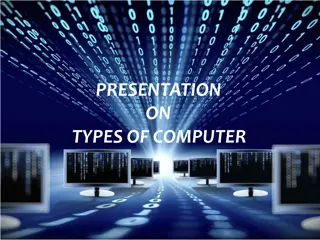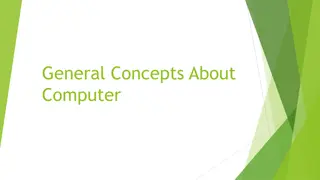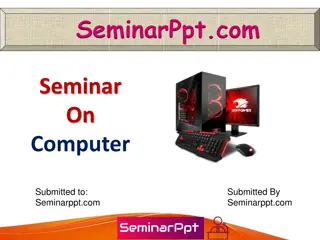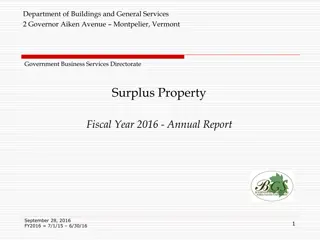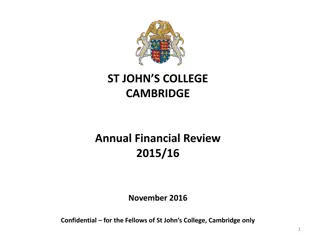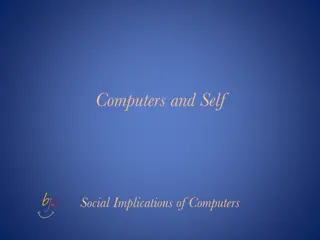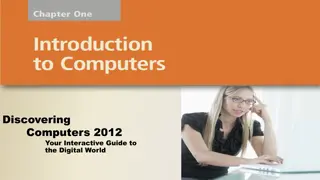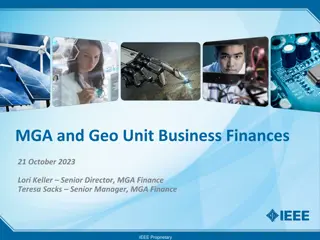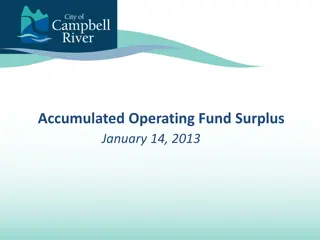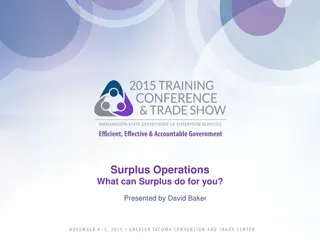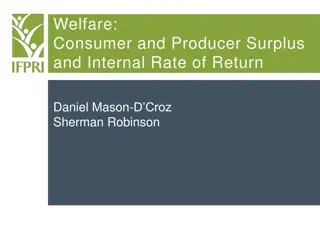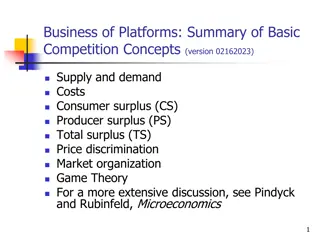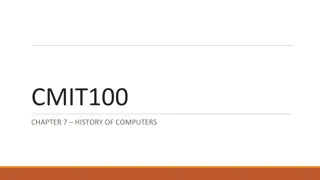Limited Excess Property Program (LEPP) Overview and Benefits
The Limited Excess Property Program (LEPP) is a unique initiative facilitating the transfer of US Government surplus property to Private Voluntary Organizations (PVOs) and USAID Missions for development projects. Managed by USAID's ASHA, LEPP provides access to quality surplus property, benefiting u
1 views • 21 slides
Essential Factors Affecting Computers' Maintenance
Computers are susceptible to damage from various factors such as heat, dust, water, corrosive liquids, and powerline problems. To ensure optimal performance and longevity, it is crucial to monitor and address these elements to prevent potential harm. Proper maintenance practices like controlling hea
5 views • 14 slides
Surplus Line Association of California: Stamping Fee Payment Guide
An introductory guide to the Surplus Line Information Portal 2.0 (SLIP) and California's Electronic Filing System, focusing on Stamping Fee Payment methods, online payment terms, and setting up automatic payments. The guide includes step-by-step instructions and images for easy understanding.
3 views • 9 slides
Piecemeal Distribution in Partnership Accounts: Surplus Capital Method Example
In partnership dissolution, assets are realized gradually, leading to uncertainty in profit or loss distribution. Piecemeal distribution methods like Surplus Capital Method help allocate cash among partners based on surplus capital. In this situation, a case study illustrates how partners A, B, and
0 views • 16 slides
Vehicle & Asset Management: Surplus Property Distribution to Local Entities
The Surplus Property Program, operated by General Services, manages the redistribution of surplus property purchased with state funding to various entities such as state agencies, local governments, and non-profit organizations. Additionally, the Federal Excess/Surplus Property Program oversees the
0 views • 16 slides
The Impact of Computers in Everyday Life
Computers play a vital role in various aspects of our daily lives, from education to business, healthcare, and banking. They help in converting data into meaningful information, enabling digital learning in schools, supporting businesses in marketing and management, aiding doctors in quicker diagnos
0 views • 9 slides
Types of Computers: Supercomputer, Mainframe, Mini, Workstation, Microcomputer
Computers come in various sizes and power ranges, each with unique capabilities. Supercomputers analyze nuclear fission models, mainframe computers have special circuits, mini computers support multi-user environments, workstations offer high processing speed, and microcomputers are affordable perso
0 views • 5 slides
Introduction to Computer Fundamentals: Learn the Basics of Computers
This tutorial covers fundamental concepts of computer hardware, software, and operating systems, explaining how computers process data, generate output, and store information. It explores the advantages of computers, such as high speed, accuracy, storage capacity, diligence, and versatility, essenti
1 views • 11 slides
Understanding the Role of Merchant Banking in Financial Services
Merchant banking plays a crucial role in the financial sector by providing specialized services such as advisory on corporate matters, international trade expertise, and M&A advice. In India, merchant banking started in the late 1960s with the introduction by Grindlays Bank. The objectives include c
1 views • 19 slides
Introduction to Computers: New Words and Expressions
Explore the fascinating world of computers with new terminology and expressions such as artificial intelligence, technology, exploration, and more. Discover the language surrounding computers and their applications, functions, and development. Enhance your understanding of this technological realm t
1 views • 19 slides
Introduction to Embedded Systems Design
Embedded Systems Design, Chapter 1 provides an insightful overview of embedded systems, distinguishing them from general-purpose computers. The chapter delves into the characteristics of embedded systems, their design considerations, and the various types of embedded computers such as general-purpos
1 views • 7 slides
Understanding Computer Systems and Organizations
In this module by Mrs. Sujata Pradhan, learn about the characteristics of computers, their basic architecture, and the role of different units and memory types. Explore the classification of computers based on operation and configuration, including digital, analog, hybrid, supercomputers, mainframes
0 views • 13 slides
Understanding Types of Computers in Information and Communication Technology (ICT)
Explore the main types of computers in ICT, including Mainframe Computers, Servers, and Personal Computers such as Desktops, Laptops, and Tablets. Learn about their functions, uses, and distinguishing features to enhance your understanding of ICT.
1 views • 20 slides
Understanding Computers: Key Components and Characteristics
A computer is a programmable electronic device designed to process, store, and retrieve data. This article delves into the key components and characteristics of computers, including hardware, software, data processing, storage, input/output devices, networking, and programming. Computers play essent
0 views • 36 slides
Caring, Safe and Excellent Financial Report August 2023
The August 2023 financial report provides a comprehensive overview of the Trust's financial status, highlighting a surplus in income and expenditure. The report discusses forecasts, risks, opportunities, capital investment programs, agency analysis, and improvement plans. Key figures include a 1.6m
0 views • 20 slides
Understanding Different Types of Computers
Explore the classifications of computers based on functionality, size, speed, and cost. Learn about analog, digital, and hybrid computers, their characteristics, and examples. Understand the distinct features and uses of each type in the world of computing.
6 views • 10 slides
Exploring General Concepts About Computers
Computers are electronic devices capable of accepting data, processing it based on instructions, and generating output. They can perform functions like input, processing, output, and storage. This article delves into the basics of what computers are, the difference between data and information, exer
0 views • 15 slides
Evolution of Computers: From Vacuum Tubes to Transistors
The evolution of computers has seen remarkable progress from the era of vacuum tube machines to the introduction of transistors. Starting from massive devices to compact and powerful systems, computers have become an indispensable part of modern life. Explore the generations of computers, their func
0 views • 22 slides
Alfred Marshall's Contributions to Economic Analysis
Explore Alfred Marshall's significant contributions to economic thought, including popularizing supply-demand analysis, consumer surplus, and producer surplus. Discover his graphical analyses of two-country trade and offer curves, shedding light on free trade outcomes and terms of trade. Dive into M
2 views • 18 slides
Understanding the Computer Fraud and Abuse Act (CFAA) of 1984
The Computer Fraud and Abuse Act (CFAA) of 1984, later amended in 1992, addresses criminal and civil liability for unauthorized access to computers and obtaining information. The law distinguishes between outsiders and insiders who exceed their authorized access. It includes provisions related to na
12 views • 33 slides
Economics Concepts Explained Through Interactive Quizzes
Understand economic concepts such as consumer surplus, producer surplus, and market equilibrium through interactive quizzes with images. Test your knowledge on topics like bidding, sentimental value, market efficiency, and surplus calculations in a fun and engaging way.
1 views • 13 slides
Understanding Basic Concepts of Information Technology
Explore fundamental concepts in Information Technology including basic terms, types of computers, hardware, software, and general IT concepts. Learn about different types of computers such as supercomputers, mainframe computers, servers, networked computers, personal computers, laptops, and handheld
1 views • 13 slides
Department of Buildings and General Services Surplus Property Program Overview
The Department of Buildings and General Services in Vermont manages the redistribution and disposal of surplus state and federal property. Their mission is to facilitate the transfer of surplus property to state agencies, municipalities, nonprofits, and the public in a cost-effective manner. The pro
0 views • 62 slides
St. John's College Cambridge Annual Financial Review 2015/16 - Summary and Analysis
This confidential Annual Financial Review for the Fellows of St. John's College, Cambridge provides detailed insights into the financial performance and outlook for the year 2015/16. It covers the income, expenditure, endowment, and school finances of the College group. The review discusses the oper
0 views • 35 slides
District of Columbia Budget Briefing & Input Session Overview
Briefing on the District of Columbia's budget covering FY 2011 achievements, fiscal challenges, surplus history, bond ratings, and the composition of the general fund balance. Highlights include a $400 million surplus in FY 2011, successful revenue increases, and prudent financial management strateg
0 views • 15 slides
Implications of Computers on Human Existence and Behavior
Exploring the philosophical debate between free will and predestination, the influence of online personas on real-life identities, the potential for computers to understand us better than ourselves, and the evolving role of humans in an increasingly automated world. These themes delve into the compl
0 views • 6 slides
Financial Period Forecast of Cash Surplus and Deficit
Forecasting the use of cash surplus from the eighteenth financial period reveals a starting deficit of CHF 3 million. Factors influencing the surplus include savings from prior obligations, full expenditure in 2023, and limited interest income due to low rates. However, the final surplus amount will
0 views • 5 slides
Introduction to Discovering Computers: Your Interactive Guide to the Digital World
Delve into the world of computers with "Discovering Computers 2012," exploring basic concepts such as the definition of a computer, its components, importance of computer literacy, and the role of computers in various sectors. Discover the distinctions between system and application software, types
0 views • 38 slides
Santa Monica College Proposed Budget Summary 2023-2024
Santa Monica College's proposed budget for 2023-2024 reflects changes in revenue and expenditure from the previous year. The budget highlights figures related to revenue streams, major expenses, surplus/deficit, and ending fund balance. Additionally, the systemwide budget and state adopted budget fo
0 views • 37 slides
MGA and Geo Unit Business Finances Overview
This document provides a detailed overview of the business finances concerning MGA and Geo Units. It covers topics such as the flow of funds to Geo Units, allocation models, reserves, spending rules, surplus processes, member dues distribution, and more. The information includes financial data, rule
0 views • 18 slides
Financial Policy Recommendations for Accumulated Surplus Management
The council policy recommends retaining an accumulated surplus up to 4% of operating expenditures, with any excess transferred to the Capital Works Reserve. The rationale behind this policy includes ensuring cash flow, setting aside funds for future expenditures, maintaining a rainy day fund, and pr
0 views • 14 slides
Enhanced Floating Surplus Price Calculation for Efficient Power Management
This overview delves into the enhanced floating surplus price calculation method introduced by Southwest Power Pool. The hybrid approach combines GHG Threshold and Floating Surplus optimization techniques to tackle challenges in the power industry. It explains how the surplus is managed and optimize
0 views • 18 slides
Surplus Operations: How We Help Agencies Manage Property Efficiently
Surplus Operations, presented by David Baker, offers property management services to agencies including state and local governments, municipalities, school districts, and non-profits. Their mission is to recover, reuse, or recycle property to avoid disposal, saving money for agency partners. Service
0 views • 34 slides
Analysis of Welfare: Consumer and Producer Surplus
This content delves into the analysis of welfare through the concepts of consumer and producer surplus, internal rate of return, and benefits versus costs associated with policy choices. It emphasizes the computation of benefits and costs over long time periods, focusing on direct and indirect measu
0 views • 16 slides
Special Pricing on Surplus Computers - Dell, Optiplex, iMac, Monitors
Explore a variety of surplus computers including Dell Optiplex GX series, iMac G4 & G5, and monitors at discounted prices. Contact the surplus specialist for availability and grab deals starting from $50. All computers come with essential accessories like keyboard, mouse, and power cord.
0 views • 4 slides
Understanding Basic Competition Concepts in Economics
Explore fundamental economic concepts like supply and demand, consumer surplus, producer surplus, total surplus, price discrimination, and game theory. Delve into cost definitions, cost technologies, and the calculation of total surplus and consumer surplus in different market scenarios.
0 views • 48 slides
Manchester Township 2017 Municipal Budget Analysis
The Manchester Township 2017 Municipal Budget shows a total budget of $33,906,697.45 with an increase from 2016. The breakdown includes categories like salaries, statutory debt, and operating expenses. The local levy reduced from 2016, and projected revenues indicate various sources contributing to
0 views • 17 slides
Understanding Welfare Analysis in Economics
Delve into the world of welfare analysis through the examination of demand and supply curves, consumer surplus, producer surplus, and social welfare at market equilibrium. Explore the impact of price ceilings and price floors on welfare, gaining insights into market dynamics and economic outcomes.
0 views • 12 slides
Evolution of Computers: From Abacus to Personal Computers
Explore the fascinating journey of computers through history, from the invention of the Abacus in 4000 BC to the development of personal computers in the modern era. Learn about the four generations of digital computers, the impact of integrated circuits, shifts in programming languages, and societa
0 views • 17 slides
Financial Highlights of School District No. 27 (Cariboo-Chilcotin) for 2022-2023 Fiscal Year
The financial statements for the School District No. 27 (Cariboo-Chilcotin) for the fiscal year 2022-2023 showcase a positive outlook with increases in accumulated surplus and operating surplus. Efforts to modernize financial records and comply with new accounting standards were highlighted. The dis
0 views • 11 slides


